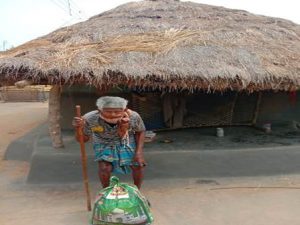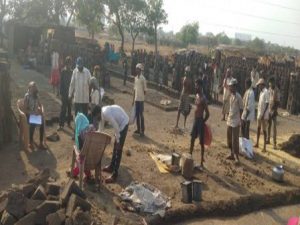COVID-19 Pandemic: A Double Jeopardy for the Marginalized Communities
Effective Covid response requires bridging the social distancing between the governments and marginalized.

The term, ‘Social distancing’ has been trending in twitter since COVID-19 got the status of pandemic. It is viewed like panacea. The World Health Organization (WHO), of course, has corrected its usage from ‘social distancing’ to ‘physical distancing’. WHO now uses the milder version of distancing, “it does not mean that socially we have to disconnect from our loved ones, from our family.” Ironically, the hallmark of the caste system has been an extreme form of ‘social distancing’, for many centuries. The caste and contagious diseases were notunrelated. Periyar pointing out notices in the hotels that used to state, ‘Panchamas (Dalits) and those with contagious diseases are not allowed’ had demanded one line from the Republic (in the Constitution), “that should state there will be no caste like Brahmins and Pariahs and there would be no castes, so no difference’(1945). The Constitution of India enacted in 1950 while disallowing the caste discrimination did not criminalize the caste system itself. The caste system is haunting the Covid relief process, even today.
Also Read : Migrant Exodus During The National Lockdown
The Covid lockdown had a cruel impact on entertainment workers from Nat, Bediya and Bacchara communities, who, in addition to being dalit, were also victims of the Criminal Tribes Act, 1871. The Act was repealed in 1952, rather rechristened as Habitual offenders Act. The names of communities apparently continue in police manual, even now, to be among ‘history-sheeters’—their aadhaar (foundation) of being born-criminals. What was their mistake? They were in a profession, which was to entertain others, including folk dances, theatre, performances in weddings and village festivals, including sex work. They were doing this from the time when sex work was not even an industry. Today, no doubt sex work is one of the largest industries and is notable for trafficking and exploitation. These communities were probably among the first victims of the corporatization of this industry, which trapped them into bondage by reaping their socially excluded status. Interviews with 106 workers across 13 districts in 5 states have thrown hard-hitting findings about these communities. The impact due to the lockdown has thrown many new loose threads, which would be important for policy makers to ponder upon.
First, the community faced their worst of recent times in the first few days of the lockdown. Of the 106 people interviewed, at least three workers stated that they stayed hungry, that is, went without food for at least one day. 38 workers have stated that there were days when they got a maximum of only one meal in a day; and 61others stated that there were days when they got a maximum of only two meals. There were only 4 who said that they were able to access three meals during the lockdown.
The distress calls that these sex workers had to make to access food and ration reflects the total breakdown or rather absence of social protection system.
While there were shelter-homes in Delhi, the community members fearing retaliation did not even attempt to go there for food. Rakesh said, “We are used to staying within our community. We avoid getting into wider community dining, especially in scenarios like this. Further, there are no shelter homes close by which are providing meals.”

Second, the myth that sex work is ‘easy money’ is totally busted. Most of these workers did not have any saving. 58 families were forced to take loans just to fulfil their basic need for food. Only 9 workers accessed PDS rations during the lockdown. Most of them had no cash. A large section of these communities depend on weddings and local festivals in small towns and villages. Sumita, remembering the day of announcement of lockdown, said, “Weddings and local functions were postponed. Festival gatherings were prohibited. We were totally shattered.” Sonia said, “Dance bars and hotels were closed. Some of these closures started becoming effective even before the announcement of the lockdown. The fear of virus also affected the overall industry.” The impact on the industry surfaced over weeks beginning early February, but many weddings and gatherings were banned abruptly once lockdown was announced. Overall, they are into hand-to-mouth living, although they incur expenses on new clothes, cosmetics and food, which often leads to their location among relatively well-off sections. In the source areas, they do invest on pucca houses for they are also part of the business. And when there is an adversity like Covid, the impact is also disastrous, for the reduction in income does not necessarily means their expenses get reduced.
Third, the community has incredible access to private credit. Of the 79 workers who took loans, 41 took loans from money-lenders or contractors or employers. This easy credit from private players has been beneficial for them to meet immediate needs, but it is also worrying given the potential impact this can have on trafficking and bonded labour in future. Narendra, who volunteers with National Alliance Group on Denotified and Nomadic Tribes said, “A background about the three communities is crucial to understand how indebtedness will fuel trafficking. All three communities are engaged in the sex industry to a certain extent, if not completely. The industry is known for its exploitation and creating channels for trafficking. To get out of the debt, it is very much possible that newer and younger girls might be pushed into commercial sex.”
Also Read : Epf Concession Will This Really Benefit Any Worker
Finally, ‘social distancing’ of the community by the society as well as administration is more visible now than ever. The community face less of a challenge to access identity documents than of revealing their identity to the relief administration. The community is used to concealing their identity. They rarely used to access PDS in non-lockdown circumstances. They preferred to pay higher ‘rent’ to get entitlements than suffer or be stigmatized by revealing their identities. During this relief period, this has not worked. Of 106 workers, 80 have PDS cards, but have never accessed PDS. Shweta said, “Even when we called helplines, we were told to approach police stations for help. We know it would not work, so we never tried.” Often the past experiences create an impression on the community about institutions that would help them and that would not.
Even at the lockdown, those experiences forced them to stay alone and starve, than to reach out to the administration.
What is also important is that these workers have proportionally good registration into various schemes. 29 workers have registered in old age or widow or disability pensions and 19 received benefits. 45 registered in Kisan Nidhi schemes and 28 received benefits. 80 workers have Jan Dhan account and 57 received cash transfer. However, none of them have accessed banks to receive the cash. Their registration is the reflection of their longing for creating evidence of their association with the government. Everything boils down to the community that one belongs to. Once it is established that a certain person belongs to one of these communities, the attempt is to keep them where they are. Immediately, every stereotype gets associated with them—‘prostitution, criminals, immoral, not capable of doing anything else, will come back to same thing later’. Many of them being women, these stereotypes impact harder. And Covid has just visibilized the cruel face of our society: its casteism and patriarchy. Will the government make any effort to bridge the social distancing that has been happening for years? Would we?
(Mayank, Tarini, Vikas, Dheeraj and Pradeep are part of the large volunteering team of National Alliance Group of Denotified and Nomadic Tribes (NAG) and Praxis Institute for Participatory Practices. More details about the study is available at http://www.praxisindia.org/covid19.php)
